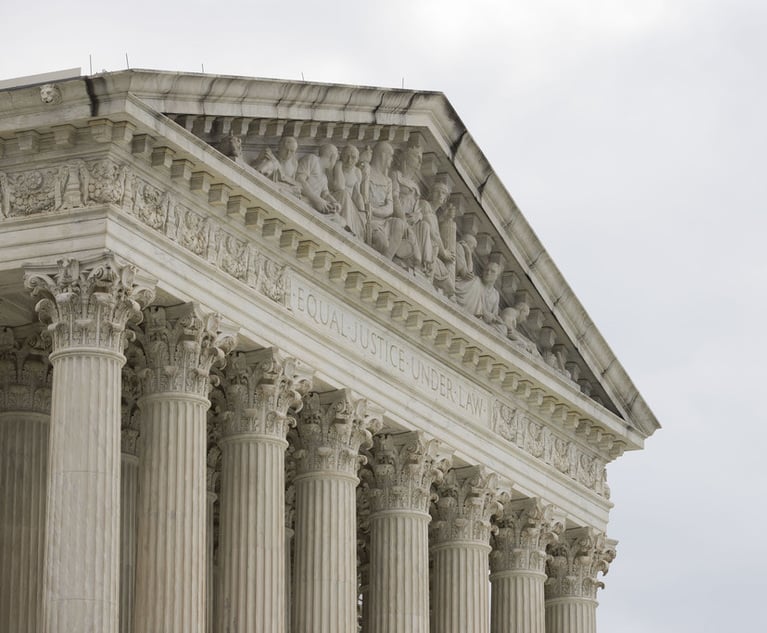SCOTUS Rejects Excessive Force 'Provocation' Doctrine, Invokes Proximate Cause
In his Section 1983 Litigation column, Martin A. Schwartz writes that the U.S. Supreme Court recently overturned the Ninth Circuit's "provocation doctrine" on the ground that it was inconsistent with Fourth Amendment excessive force jurisprudence. The court held that whether officers who conduct an unconstitutional search are liable for injuries from their subsequent use of force depends upon the application of traditional proximate cause principles—but applying proximate causation in these circumstances is easier said than done.
July 10, 2017 at 02:03 PM
11 minute read
Physical entry into the home is the chief evil the Fourth Amendment was designed to prevent. Absent consent or exigent circumstances, the police need a warrant to enter a person's home. But what if the police intentionally make an unconstitutional entry into a home and, once inside, reasonably fearing they are in imminent danger of serious physical harm, employ deadly force? Under the circumstances the use of force was reasonable, but it may not have been necessary if the police had not conducted the unconstitutional entry. The Ninth Circuit had formulated the “provocation doctrine” for this type of situation. Under this doctrine the officer could be held liable for injuries from the use of force which was otherwise reasonable, but which was a foreseeable consequence of his intentional or reckless unconstitutional search.
In County of Los Angeles v. Mendez, 137 S. Ct. 1539 (2017), the U.S. Supreme Court, in a unanimous decision written by Justice Samuel A. Alito Jr., recently overturned the provocation doctrine on the ground that it was inconsistent with the court's Fourth Amendment excessive force jurisprudence. The court held that whether officers who conduct an unconstitutional search are liable for injuries from their subsequent use of force depends upon the application of traditional proximate cause principles. As we will see, applying proximate causation in these circumstances is easier said than done.
Background
Deputy sheriffs in California were searching for a parolee-at-large named Ronnie O'Dell, who was considered armed and dangerous. They learned from a confidential informant that O'Dell was seen at a home owned by Paula Hughes, and that Angel Mendez and his wife lived in a shack in the backyard of her home. After failing to find O'Dell in Hughes's home, the officers, without a warrant and without knocking and announcing their presence, entered the Mendez shack. Angel Mendez was holding a BB gun closely resembling a small caliber rifle, which he kept for use on rats and other pests. When the officers entered the shack, the BB gun was pointed “somewhat” at Deputy Sheriff Conley. “Deputy Conley yelled 'Gun!' and the deputies immediately opened fire, discharging a total of 15 rounds. Mendez and [his wife] 'were shot multiple times and suffered severe injuries,' and Mendez's right leg was later amputated below the knee.” 137 S. Ct. at 1545 (citation omitted). O'Dell was not in the shack or anywhere on the Hughes property.
The Mendezes' §1983 complaint asserted three Fourth Amendment claims: (1) warrantless entry into their home, (2) failing to knock and announce, and (3) use of excessive force. After a bench trial, the district court found that the warrantless entry and failure to knock and announce violated the Fourth Amendment, but awarded the plaintiffs only nominal damages for these violations. The court found the deputies' use of force reasonable but held for the plaintiffs under the circuit court provocation doctrine, because their shooting of the plaintiffs resulted from their intentional Fourth Amendment violations, namely, the warrantless entry and failing to knock and announce. The district court awarded plaintiffs approximately $4 million damages on their excessive force claim.
This content has been archived. It is available through our partners, LexisNexis® and Bloomberg Law.
To view this content, please continue to their sites.
Not a Lexis Subscriber?
Subscribe Now
Not a Bloomberg Law Subscriber?
Subscribe Now
NOT FOR REPRINT
© 2025 ALM Global, LLC, All Rights Reserved. Request academic re-use from www.copyright.com. All other uses, submit a request to [email protected]. For more information visit Asset & Logo Licensing.
You Might Like
View All
For Safer Traffic Stops, Replace Paper Documents With ‘Contactless’ Tech
4 minute read
Impact of New NYS Workers’ Compensation Work-Related Stress Relief on Discrimination Claims

Justices Will Weigh Constitutionality of Law Allowing Terror Victims to Sue PLO

Are New York City Housing Providers Ready for the Fair Chance for Housing Act?
10 minute readTrending Stories
- 1'A Death Sentence for TikTok'?: Litigators and Experts Weigh Impact of Potential Ban on Creators and Data Privacy
- 2Bribery Case Against Former Lt. Gov. Brian Benjamin Is Dropped
- 3‘Extremely Disturbing’: AI Firms Face Class Action by ‘Taskers’ Exposed to Traumatic Content
- 4State Appeals Court Revives BraunHagey Lawsuit Alleging $4.2M Unlawful Wire to China
- 5Invoking Trump, AG Bonta Reminds Lawyers of Duties to Noncitizens in Plea Dealing
Who Got The Work
J. Brugh Lower of Gibbons has entered an appearance for industrial equipment supplier Devco Corporation in a pending trademark infringement lawsuit. The suit, accusing the defendant of selling knock-off Graco products, was filed Dec. 18 in New Jersey District Court by Rivkin Radler on behalf of Graco Inc. and Graco Minnesota. The case, assigned to U.S. District Judge Zahid N. Quraishi, is 3:24-cv-11294, Graco Inc. et al v. Devco Corporation.
Who Got The Work
Rebecca Maller-Stein and Kent A. Yalowitz of Arnold & Porter Kaye Scholer have entered their appearances for Hanaco Venture Capital and its executives, Lior Prosor and David Frankel, in a pending securities lawsuit. The action, filed on Dec. 24 in New York Southern District Court by Zell, Aron & Co. on behalf of Goldeneye Advisors, accuses the defendants of negligently and fraudulently managing the plaintiff's $1 million investment. The case, assigned to U.S. District Judge Vernon S. Broderick, is 1:24-cv-09918, Goldeneye Advisors, LLC v. Hanaco Venture Capital, Ltd. et al.
Who Got The Work
Attorneys from A&O Shearman has stepped in as defense counsel for Toronto-Dominion Bank and other defendants in a pending securities class action. The suit, filed Dec. 11 in New York Southern District Court by Bleichmar Fonti & Auld, accuses the defendants of concealing the bank's 'pervasive' deficiencies in regards to its compliance with the Bank Secrecy Act and the quality of its anti-money laundering controls. The case, assigned to U.S. District Judge Arun Subramanian, is 1:24-cv-09445, Gonzalez v. The Toronto-Dominion Bank et al.
Who Got The Work
Crown Castle International, a Pennsylvania company providing shared communications infrastructure, has turned to Luke D. Wolf of Gordon Rees Scully Mansukhani to fend off a pending breach-of-contract lawsuit. The court action, filed Nov. 25 in Michigan Eastern District Court by Hooper Hathaway PC on behalf of The Town Residences LLC, accuses Crown Castle of failing to transfer approximately $30,000 in utility payments from T-Mobile in breach of a roof-top lease and assignment agreement. The case, assigned to U.S. District Judge Susan K. Declercq, is 2:24-cv-13131, The Town Residences LLC v. T-Mobile US, Inc. et al.
Who Got The Work
Wilfred P. Coronato and Daniel M. Schwartz of McCarter & English have stepped in as defense counsel to Electrolux Home Products Inc. in a pending product liability lawsuit. The court action, filed Nov. 26 in New York Eastern District Court by Poulos Lopiccolo PC and Nagel Rice LLP on behalf of David Stern, alleges that the defendant's refrigerators’ drawers and shelving repeatedly break and fall apart within months after purchase. The case, assigned to U.S. District Judge Joan M. Azrack, is 2:24-cv-08204, Stern v. Electrolux Home Products, Inc.
Featured Firms
Law Offices of Gary Martin Hays & Associates, P.C.
(470) 294-1674
Law Offices of Mark E. Salomone
(857) 444-6468
Smith & Hassler
(713) 739-1250






